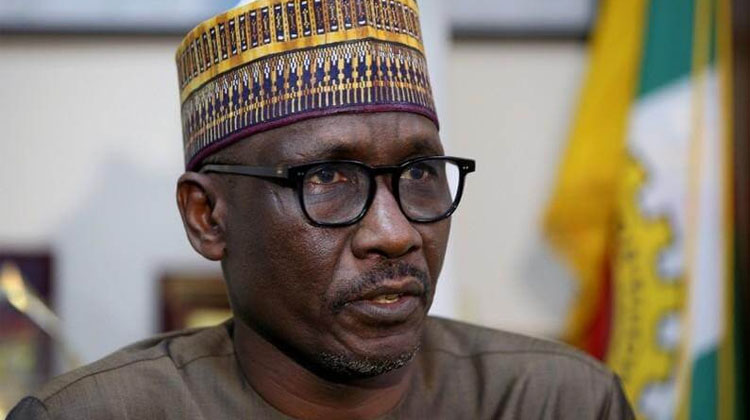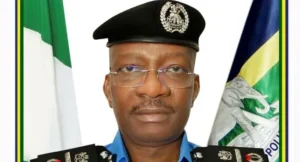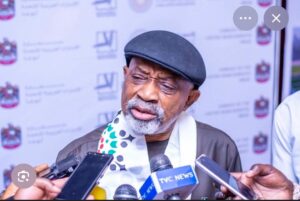
Why Tinubu sacked Kyari as NNPCL boss
Fresh facts have emerged on why President Bola Tinubu sacked the Group Chief Executive Officer (CEO) of the Nigerian National Petroleum Company Limited (NNPCL), Mele Kolo Kyari and dissolved the company’s board.
The president announced Kyari’s removal alongside the dissolution of the NNPCL board in a statement issued early Wednesday.
Bayo Onanuga, the Special Adviser to the President on Information and Strategy, confirmed that Tinubu “approved a sweeping reconstitution of the NNPCL board, removing Chairman, Chief Pius Akinyelure and Group CEO, Mallam Mele Kolo Kyari.
“President Tinubu removed all other board members appointed with Akinyelure and Kyari in November 2023”, the statement said.
Although the presidency did not specify the reason for the board’s reconstitution, sources said that Kyari’s sack had long been anticipated but delayed for reasons known only to the president. Some sources suggested that his involvement in some strategic projects of the president may have influenced the delay.
Kyari, who turned 60 on January 8, was reportedly slated for removal before the end of that month, but the president decided to hold off the announcement, despite already constituting the new board. Insiders noted that the delay, rather than the dismissal itself, was the more surprising development.
An online medium, EmpoweredNewswire, reported on February 6, 2025 that the president had finalised plans to reorganise the NNPCL board. The medium accurately predicted the appointments of Mr. Bayo Ojulari as new Group CEO and Mr. Ahmadu Musa Kida as board chairman.
One source, speaking anonymously due to the sensitive nature of the matter, asked, “The key question observers should ask is why Mele Kyari stayed in office for so long before his removal on Tuesday.”
The source pointed out that President Tinubu had replaced the heads of several prominent government agencies, including the Nigerian Ports Authority (NPA), the Nigerian Maritime Administration and Safety Agency (NIMASA), the Central Bank of Nigeria (CBN), the Economic and Financial Crimes Commission (EFCC), the Federal Inland Revenue Service (FIRS), the Federal Airports Authority of Nigeria (FAAN), and the Nigeria Customs Service (NCS).
“Yet, Kyari remained the longest-serving CEO of the NNPCL. His tenure extension, despite changes in other agencies, was unusual”, the source added.
Under Kyari’s leadership, NNPCL facilitated the acquisition of OVH Energy Marketing, which operated Oando-branded retail stations. The deal, announced in October 2022, included over 380 filling stations, a reception jetty with a monthly capacity of 240,000 metric tonnes, eight liquefied petroleum gas plants, three lube blending plants, three aviation depots, and 12 warehouses.
The acquisition, valued at $325.09 million (about N140.55 billion), was seen as a significant expansion move for NNPCL. One source described the deal as beneficial for both NNPCL and its business strategy.
“Before the deal, NNPCL had limited presence in aviation fuel and lubricants. After acquiring Oando, the company’s profile improved significantly,” the source said. “This boosted Kyari’s reputation as an effective leader within the industry.”
The acquisition, valued at $325.09 million (about N140.55 billion), was seen as a significant expansion move for NNPCL. One source described the deal as beneficial for both NNPCL and its business strategy.
“Before the deal, NNPCL had limited presence in aviation fuel and lubricants. After acquiring Oando, the company’s profile improved significantly,” the source said. “This boosted Kyari’s reputation as an effective leader within the industry.”
For instance, in 2019, the nation spent about N154 billion on fuel subsidy. But by the end of 2022, it was reported that fuel subsidy gulped N4 trillion in that year alone.
Sources said that Kyari’s leadership also struggled with production levels and revenue generation, with crude oil output averaging 1.5 million barrels per day, far below target.
This has happened despite the Kyari-led management’s investment in digital tracking equipment, which is said to be monitoring oil exploration activities online real-time.
Rehabilitation of refineries
Another key area of concern, some sources said, are the failure to bring the nation’s refineries back to life, despite dissuading the Buhari administration from its plan to sell them off, and committing $1.5 billion to the Port Harcourt Refinery alone.
It was widely acknowledged that Kyari led the NNPC’s transition from the status of a public corporation to a limited liability company. However, there have been concerns that the company’s operations were still not efficient. Over time, state governments have complained about non remittances of revenue to the Federation Account. This is despite earlier impressions that the NNPCL had already been out of its loss making status. It declared a loss of about N803 billion for its 2018 operations and N1.7 trillion for 2019.
The Dangote Refinery debacle
The NNPCL’s relationship with Dangote Refinery also raised concerns, especially when the refinery became operational. The breakdown of the Naira-for-crude deal, ordered by the president last year, was seen as a contributing factor in Kyari’s departure.
Before this, there had been complaints about Kyari’s handling of the crisis with Dangote Refinery, as well as ongoing issues with the Port Harcourt Refinery.
In March, the National Bureau of Statistics released a report showing that Nigeria’s petrol imports continued to rise, despite increased domestic refining capacity. The report revealed that Nigeria imported N3.3 trillion worth of petrol in the last quarter of 2024, making petrol the country’s most traded import.
Energy analysts argue that Nigeria’s continued reliance on imported fuel is a drain on the country’s resources, exacerbating its economic challenges.
‘Board’s weakness hastened dissolution’
The dissolution of the NNPCL board is expected to bring fresh perspectives to the company, with a focus on improving long-term objectives. Sources noted concerns over the board’s weakness in countering some of Kyari’s excesses.
“The board’s perceived weakness in checking Kyari’s power was partly due to his deep knowledge of the company’s operations, having risen through the ranks,” said one analyst.
The new board members, who are mostly technocrats, are expected to implement reforms aimed at improving transparency, aligning operations with national economic goals, and strengthening corporate governance.
As Nigeria seeks to stabilise its fiscal base and accelerate gas commercialisation, industry experts believe that a more efficient and accountable NNPCL will play a central role in meeting these objectives.
However, analysts warn that the success of these changes will depend on the Tinubu administration’s faithfullness to enforcing corporate governance standards. This, the analysts say, is the most critical requirement to promoting operational efficiency within the NNPCL.
CBN denies new N5,000, N10,000 banknotes report
Unity Cup 2025: London to host Nigeria, Ghana, Jamaica, Trinidad and Tobago in May
Share your story or advertise with us: Whatsapp: +2348033202396 Email: sentinelnewsng@gmail.com








